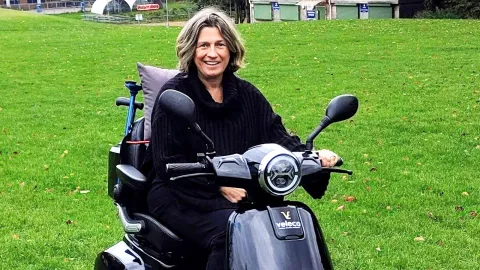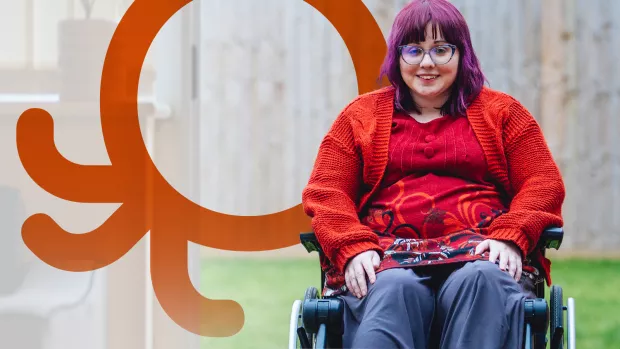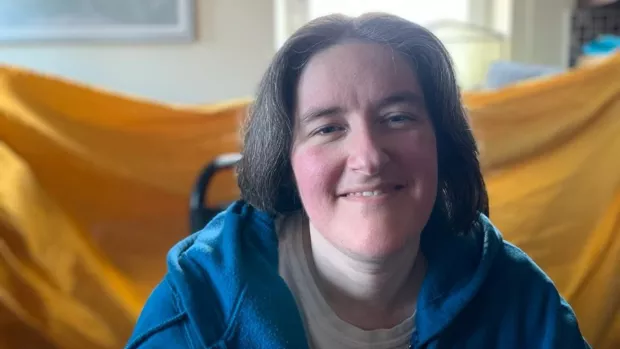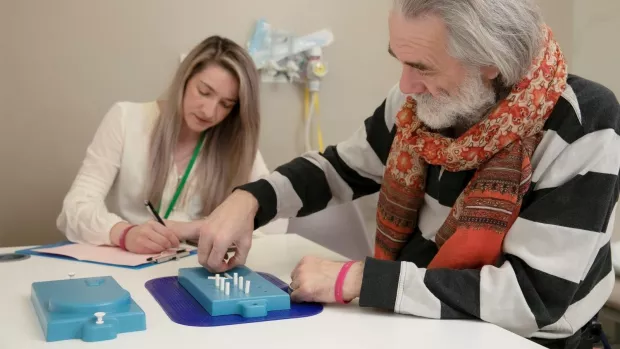
“Being part of a trial means someone actually looks at you”
Milla lives with secondary progressive MS. We spoke to her about what it’s like to be part of the MS-STAT2 trial and her hopes for the future.
How did you get diagnosed with MS?
I was visiting my GP and he noticed something strange about my walk, so he suggested I saw a neurologist. That was when I was 53. I’d had two bouts of optic neuritis in my early thirties. I was told at the time that it was a symptom of MS. So I’d had it in my head for about 20 years that getting MS could be a possibility.
I could’ve gone after a diagnosis then, but I decided not to. In my head, it gave me 20 years of not worrying about every ache and pain. I ended up getting married and having IVF to have my daughter. And I wonder if I’d have done those things if I’d been diagnosed.
Read more about MS symptoms and signs
Where did your support come from at that time?
Certainly my husband. Some close friends made an effort – some ran for the hills. Nina, an old friend of mine, and a couple of my other friends from university have MS. So it was good to know I could reach out to them.
Were you offered any treatments after your diagnosis?
I was told pretty quickly that there weren’t any current drugs to slow down the damage caused by my MS. I’d heard about siponimod to slow it down. But both doctors I was seeing said it wasn’t likely to help because of the stage I was at.
One of the doctors said I could take part in a clinical trial, which could give me access to the latest research. So I thought 'great, I’ll try and find one because then I’m at least informing myself as often as I can.'
That was in the September. And the physiotherapist running the Southampton site, Libby Jarman, was in touch by January.
How did you feel at the start of the trial?
It can feel like you’re just put in a corner when you’re given a progressive MS diagnosis. And I feel I didn’t have anywhere to channel my emotions (other than at my husband!) But being part of a trial means someone actually looks at you – fairly regularly, too.
I’ve seen Libby pretty regularly for the last three years. And I’ve been seen by a neurologist who gave me a head to toe exam. They also take your bloods every three months – all that good stuff.
In the early stages, I really had time to share how frightened I was. I was fearing the worst and all I’d done was read things on Google. But Libby has done a lot to reassure me since.
Have you experienced any challenges while on the trial?
I think I get a bit of ‘white coat syndrome’ before my check-in appointments. I can see it coming up in my diary and I sometimes think “what about if I’ve gone downhill?”
I don’t know if I’m on the statin or the placebo (dummy drug), but my results have been pretty regular so far. I also have to remember to take the medication every day. They gave me a diary to fill out every day to keep track of this.
And what about positives?
As a couple, it’s really helped my husband and me. He gets to come down and meet the neurologist and the lady running the trial. He can see me filling out the tests and doing the tasks they set, and I think it’s really reassuring. It’s been great for him to get the same level of support as I do and to see for himself that I’m actually ok.
What’ll happen next?
I’ve been asked to stay on this trial for another 18 months. But they’ve already asked if I’d be interested in joining another one after that. It’s still early days, but she’s mentioned Octopus as a possible next step.
It feels like the best way to access the knowledge base and stay connected.
Has taking part in the trial changed your perspective on future MS treatments and research?
Yes, I feel like we’re closer than we’ve ever been to finding treatments for everyone with MS. So the best thing to do is keep plugging away at these things and keep trying. I’m delighted they keep finding new angles in research for people with MS.
What difference would it make if there were more treatments available for progressive MS?
I hope it’d help the next generation of people diagnosed with it. It’s so important for anyone who’s newly diagnosed to feel hopeful that they can stop MS in its tracks. Or even to know they can slow progression. Wouldn’t it be great if this research found a treatment that slowed things down or stopped them, for everyone?
I think all people want are options. And, at the moment, people with progressive MS don’t have many. That can be quite daunting. But I’m hopeful we’ll get somewhere by continuing research. It could be tomorrow, it could be next year. Something might just work.
What would you say to someone who’s thinking about joining a trial?
Join one. Definitely join one. Because you never know what might come from it. You won’t know what you’re getting on the trial, but the community and support that comes with it is a win in itself.




